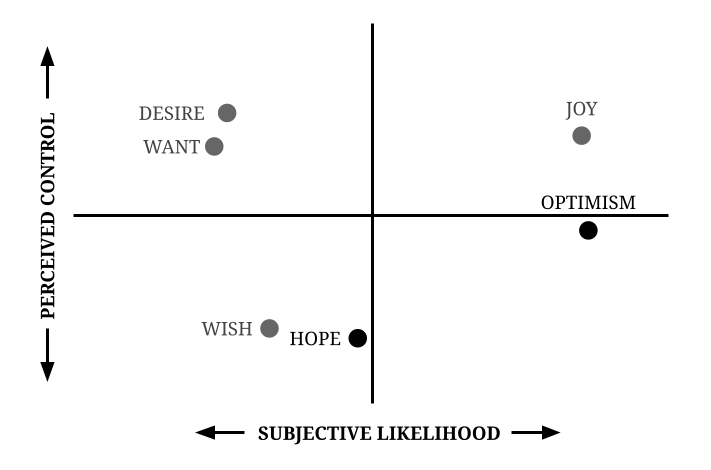Hope and optimism are often used interchangeably. “I’m hopeful about my prospects” or “I’m optimistic about the future.” But hope and optimism are two different concepts. While they’re both beneficial in their own way, it’s important to learn the difference and knowing when one may be better suited than the other. It may seem like a trivial vocabulary discussion, but there is actually quite a bit of science behind the distinction between hope and optimism.
Confusing hope and optimism
Looking at the dictionary definitions of hope and optimism, it’s not hard to understand why we tend to confuse them. According to the Cambridge Dictionary, hope is “something good that you want to happen in the future, or a confident feeling about what will happen in the future,” and optimism is “the quality of being full of hope and emphasizing the good parts of a situation, or a belief that something good will happen.”
In a study called Distinguishing Hope from Optimism and Related Affective States, researchers asked participants to define hope, optimism, and other related concepts such as wanting, desire, wishing, and joy, and to write about a time when they had experienced each of these states. Overall, they found that “hope is most closely related to wishing but distinct from it. Most important, hope is distinct from optimism by being an emotion, representing more important but less likely outcomes, and by affording less personal control.”

As you can see on this graph from the research paper, hope and optimism are not that similar to each other. They are on a spectrum and vary greatly in terms of subjective likelihood—how certain we are that the event will happen—and perceived control—how much we think we can influence the outcome.
Another study looked at football fans. The researchers found that fans of poorly performing football teams were pessimistic, yet hopeful. On the other hand, fans of top-tier teams were more optimistic.
“Hope may be what individuals turn to when the prospect of obtaining their personally significant desire is unclear. As the invested participants became more confident of success, their hope scores aligned more with likelihood and followed a similar trajectory to that of optimism. It is at these high levels of likelihood that the more assured top-tier football team supported showed optimism to be indistinct from hope. This suggests that hope’s true and unique nature is in the realm of possibility, when individuals are dealing with greater uncertainty.”
In other words, hope is when you are uncertain about what will happen, feel like you have little control, but still wish for a positive outcome. In the case of optimism, you have more perceived control, and believe more in a positive outcome.
When hope is helpful
“Hope is the most evil of evils because it prolongs man’s torment.” – Friedrich Nietzsche.
More uncertainty and less perceived control—hope sounds more akin to wishful thinking. Is it to say that hope is useless and harmful? While nihilists may agree, science shows that hope may indeed be helpful.
An interesting study looked at the impact of hope and optimism on social support. The research was conducted with about a hundred people who had been injured in terrorist attacks and their spouses. They found that the survivor’s hope was negatively associated with the spouse’s experience of PTSD, anxiety, and depression. But the spouse’s optimism had a negative association with the survivor’s trauma experiences. That is to say, the survivor’s hope benefited their spouse, but the spouse’s optimism benefited the survivor.
Why is that? “When spouses observe survivors as exhibiting hope, they may develop stronger faith in the ability of the survivors to deal with the consequences of the trauma, which in turn, may diminish their own symptoms. (…) When survivors perceive their spouses as optimistic, the spouses may be conveying that things will eventually turn out well even if the current situation is extremely difficult.”
A hopeful survivor shows emotional strength despite the uncertainty and their lack of control on the situation, which is reassuring to the spouse. An optimistic spouse shows control and certainty in a better future, which is reassuring to the survivor. In contrast, a hopeful spouse would exhibit signs of uncertainty.
Hope is helpful in times of uncertainty. It’s what can keep us going when we don’t know what will happen and have little control over the outcome. But sometimes, hope can give us a false sense of reassurance and prevent us from taking matters in our hands. When you feel hopeful—uncertain but hoping something good will happen—ask yourself: is there anything I could do to make that outcome more likely? Is there any way I can gain more control?
It’s not always possible, and there are many matters where we are unfortunately powerless, just hoping for the best, but in some cases it is possible to convert your hope into optimism.
